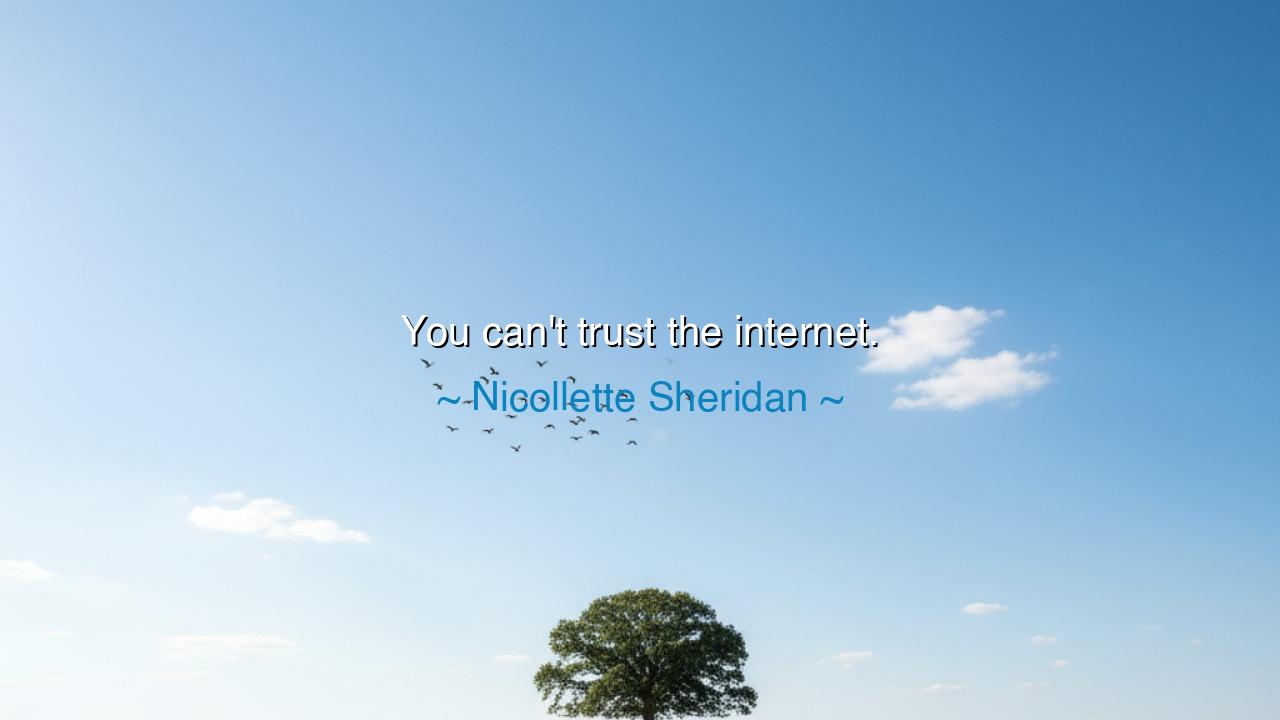
You can't trust the internet.






In the age of information, we are surrounded by an ever-expanding universe of knowledge, a universe at the tip of our fingers. The words of Nicollette Sheridan, "You can't trust the internet," echo with a powerful and poignant truth about the vast, sometimes perilous realm of digital connectivity. The internet, which offers access to endless stores of information, has become both a blessing and a curse. It is a tool capable of enlightening the mind, yet it also harbors the potential to deceive and distort. In this boundless world, the question arises: can we truly trust what we see, hear, and read?
The ancients understood the importance of wisdom and discernment when it came to acquiring knowledge. Socrates, the great philosopher, warned against relying solely on the senses and emotions to determine truth. He knew that appearances could be deceiving and that true wisdom came from deep reflection and reasoning. In his pursuit of truth, he did not seek to accept ideas at face value but constantly questioned, probed, and analyzed. The same caution that Socrates applied to the world of physical reality must be applied today to the digital world. The internet, for all its vastness, is not immune to deception or distortion; it is, in many ways, a reflection of the human mind, capable of both great enlightenment and misleading confusion.
To understand the weight of Sheridan’s warning, let us consider the tale of P.T. Barnum, the famed showman of the 19th century. Barnum was a master of illusion, of creating spectacles that dazzled the masses. One of his most famous phrases, "There’s a sucker born every minute," speaks to the very nature of how the human mind can be manipulated. Barnum understood that people could be easily deceived if they were not cautious about the information they consumed. The internet, in its unregulated vastness, is ripe for the same kind of manipulation, where truth is often clouded by falsehoods, exaggerations, and outright fabrications. What Barnum did with physical spectacles, the digital world does on a far larger and more pervasive scale.
The internet is like a vast marketplace, bustling with ideas, products, and opinions. But within this marketplace, just as in ancient markets, there are charlatans and peddlers who seek to exploit the unwary. Historical figures like Lysander Spooner, the 19th-century intellectual and abolitionist, warned against the unexamined use of information and technology. He believed that true liberty lay in the capacity to think for oneself, to question authority, and to seek out truth independently. In much the same way, we must approach the information we encounter on the internet with skepticism, understanding that just because something is widely available does not make it true or trustworthy.
In our modern world, the internet has become a tool for connection, allowing us to interact with people across the globe, share knowledge, and access endless streams of content. Yet, for all its advantages, it is also a breeding ground for misinformation and half-truths. Consider the rise of social media, where false narratives can spread like wildfire, shaping public opinion based on fabricated realities rather than actual facts. This phenomenon has led to widespread confusion and division, echoing the very warning of Sheridan: "You can't trust the internet." Just as ancient societies had their own methods of controlling information, today we must remain vigilant and discerning, recognizing that not all knowledge is meant for our benefit.
The lesson here, therefore, is not to reject the internet altogether, but to engage with it wisely. Sheridan’s warning serves as a call for discernment, a reminder that the tools we use to navigate the world must be handled with care. Critical thinking is the shield against the weapon of deception. Just as the ancients would rely on the wisdom of their elders and mentors, so too must we seek out reliable sources and question what we are told. We must develop the discipline to verify information, to seek out the truth behind the noise, and to engage with the world in a way that is thoughtful and informed.
In practical terms, let us take this lesson to heart: when we encounter new information, whether on the internet or in any other form, let us pause and ask: is this true? Who is presenting this information, and what is their intent? Challenge the narratives we encounter, seek out the original sources, and cross-check what we are told. Only through such diligence can we guard ourselves against the dangers of a world that often prioritizes speed over accuracy. Like the philosophers of old, let us question, let us reflect, and let us never stop searching for the truth, even in the digital age where the line between reality and illusion can often become blurred.






AAdministratorAdministrator
Welcome, honored guests. Please leave a comment, we will respond soon